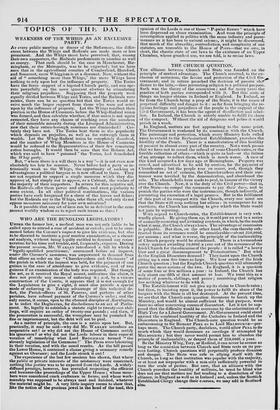THE CHURCH QUESTION.
THE alliance between Church and State was founded on the principle of mutual advantage. The Church received, to the ex- clusion of sectarians, the favour and protection of the Civil Go- vernment; and in return preached the doctrine of passive ober-- dience to the laity,—thus perverting religion to a political purpose. Such was the theory of the connexion ; and for many sears the practice of both parties corresponded with it. But this state of things no longer obtains in Ireland or England. In Ireland, so far from the Church being a prop of the State, it is the cause of perpetual difficulty and danger to it : so far from bringing the re- ligious feelings and prejudices of the people to the support of the Civil Government, it has been the agent of disaffection and rebel- lion. In Ireland, the Church is utterly unable to fulfil its share of the compact. Without the aid of dragoons and police it would perish in a week.
In England, matters are fast approaching to the same point.
The Government is weakened by its connexion with the Church. The patronage and protection, which every Ministry feels called upon to extend to the Ecclesiastical Establishment, provokes the hostility of the People. There is a manifestation of this hostility at present in almost every part of the country. Not a week passes that we have not to record the refusal of some Church-rates, or the forcible collection of others—which is quite as bad—or the failure of an attempt to collect them, which is much worse. A case of this kind occurred a few days ago at Birmingham. Properly was seized, and advertised to be sold by auction, for the payment of Church-rates ; but the people rose en masse, and, though they committed no act of violence, the Churchwardens and their auc- tioneer were terrified by the demonstration, and abandoned the sale. The church-bells were made to peal, in honour of the victory over the Church. Now, it is the duty of the Civil power—that is, of the State—to compel the recusants to pay their dues, and to punish the parties who were the instruments, though indirectly, of preventing the execution of a legal process. But in the fulfilment of this part of its compact with the Church, every one must see- that the State will reap nothing but odium : in recompense for its exertions, the Church has nothing to give which the State would. nut gain by rejecting.
With regard to Church-rates, the Establishment is very awk- wardly placed. By giving them up; it would put an end to a series of annually recurring and irritating contests, in which, be the result what it may, the Church always loses. The advantage of concession is palpable. But then, on the other hand, the sum thereby sub- tracted from its revenues would be considerable—about 250,0001. per annum ; and what is worse, the principle of the inalienability of Church property would be abandoned. There is a tremendous outcry against awarding 50,000/. a 3 ear out of the revenues of the Irish Church for the education of the people : it is called "a heavy blow and a great discouragement to Protestantism." But what do the English Dissenters demand ? They insist upon the Church giving up a sum five times as large. We hear much of the Irish Church question ; but the English Church question will ultimately prove the more serious of the two. In England, it is a question of some four or five millions a year : in Ireland, the Church has only about one-fifth of that amount to lose. We treat this as a matter of pounds, shillings, and pence ; conceiving that religion has nothing whatever to do with it. The Establishment will not give up its claim to Church-rates ;
but then, in insisting upon it, the power to fulfil its share of the bargain with the State is all but destroyed. At the present time,. we see that the Church-rate question threatens to break up the Ministry, and would be almost sufficient for that purpose, were there no other concurring causes of discontent. Let it not be sup- posed that the difficulty would be overcome by the substitution of a High Tory for a Liberal Government. No Government could stand against the combined hostility of the Catholics in Ireland and the Dissenters in England. The Church-rate question would be as embarrassing to Sir ROBERT PEEL as to Lord Maneoustee—per- baps more. The Church party, doubtless, would allow PEEL to do much which they would denounce as sacrilege if attempted by MELBOURNE ; but they never would permit him to abandon the principle of inalienability, or despoil them of 250,0001. a year.
Be the Ministry Whig, Tory, or Radical, it can never be secure as
long as the connexion between Church and State rests on its pre- sent footing. Church questions will perpetually produce disunion and danger. The State was safe in allying itself with the Church, as long as that institution was popular with the majority, or at least not unpopular with a minority sufficiently powerful to turn the scale of parties. But now, that an alliance with the Church provokes the hostility of millions, he must be blind who does not see that matters are fast tending to a dissolution of the alliance, in England as well as in Ireland ; and, unless the Scottish aElsso.tablished Clergy change their courses, we may add in Scotland


























 Previous page
Previous page